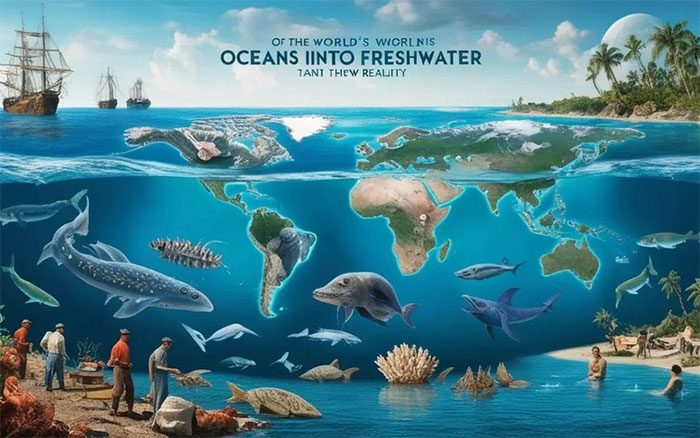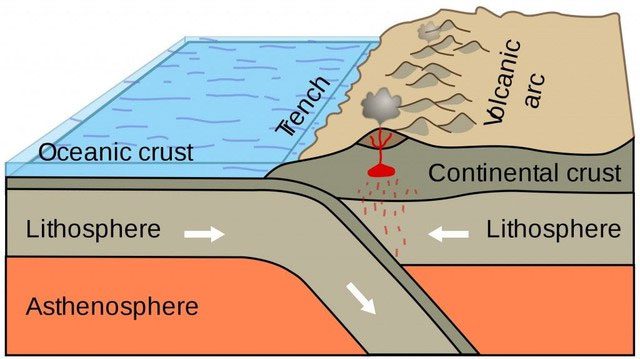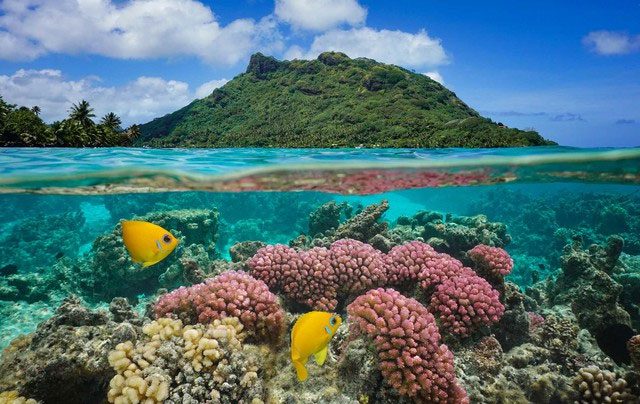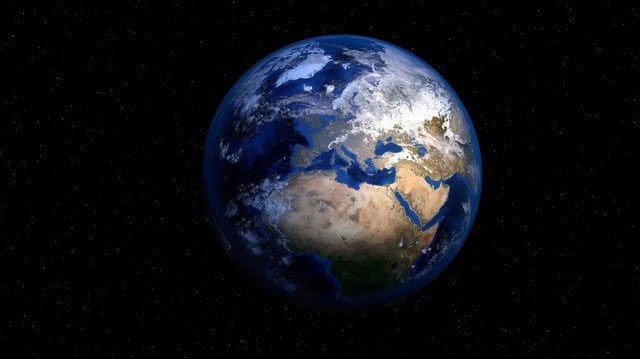A world without saltwater would be beneficial for humanity, but it would also devastate marine life and significantly affect our global temperatures and weather patterns, complicating human life on Earth.
Water is a vital resource for all life on Earth, yet in reality, this resource is becoming increasingly scarce. For thousands of years, humanity has struggled with issues related to the supply of clean water, from building water supply systems to creating water filtration technologies and implementing water conservation initiatives.
In this context, a question that may provoke thought is: “What would happen if our oceans no longer contained saltwater?” Would a world with freshwater oceans offer a bright future, or would it lead to unpredictable consequences for both marine life and Earth’s climate?

About 3.8 billion years ago, the water on this planet was originally pure freshwater. (Illustrative image).
To understand this issue better, we need to revisit the formation of the oceans and the characteristics of seawater. Approximately 3.8 billion years ago, as Earth formed and cooled after tectonic plates broke apart, the water on this planet was pure freshwater. In the early stages of Earth’s history, there was no salt in the oceans, and the water on the planet’s surface was very pure.
However, changes occurred rapidly. As climate cycles began, rainfall, which had dissolved small amounts of carbon dioxide from the atmosphere, became slightly acidic and started eroding the rocks on Earth’s surface. This erosion process released salts and minerals into streams and rivers, which eventually flowed into the oceans. This created a continuous cycle of rainfall, rock erosion, and mineral transformation into the oceans. This process has persisted for billions of years, resulting in the vast amounts of salt present in our oceans today.
Therefore, if we calculate the total amount of salt in the oceans, the figure is quite impressive. If all the salt from the oceans were evenly distributed across the land area, this layer of salt would reach a height of up to 40 stories! It is no surprise that currently, 97% of the planet’s water is saltwater, with only 3% being freshwater.
As the scarcity of freshwater becomes increasingly severe, the idea of a salt-free ocean—meaning oceans transformed into freshwater—has been proposed as an ideal solution to this problem. If the oceans contained freshwater, humanity could easily access an endless resource, helping to quench the thirst of billions around the world. However, is this truly a solution or merely a dangerous illusion?

The idea of a salt-free ocean is proposed as a solution to the freshwater shortage. (Illustrative image).
To answer this question, we need to understand that such a change would have profound effects on marine ecosystems, climate, and human life.
The current marine ecosystem is incredibly diverse and rich. It is estimated that about 230,000 marine species have been identified, but this number could rise to 2 million when considering undiscovered marine life. These species have adapted to a saltwater environment over millions of years of evolution. However, if the oceans were to become freshwater, this would trigger a major crisis in marine ecosystems.
One of the groups of organisms that would be most severely affected is plankton and seaweed species. These organisms play a crucial role in sustaining life under the ocean. Seaweed, for example, accounts for nearly half of the photosynthesis on this planet. The photosynthesis process of seaweed not only helps produce oxygen for the planet but also absorbs carbon dioxide, contributing to climate regulation. If seaweed and plankton cannot survive in a freshwater environment, we would not only face a shortage of oxygen but also an excess of carbon dioxide in the atmosphere, exacerbating climate change.
Saltwater fish species such as tuna, sharks, and whales have evolved to live in saltwater environments, and they can drink saltwater to survive. These species have developed complex mechanisms to process excess salt in their bodies, allowing them to thrive in saline conditions. Meanwhile, fish such as salmon can live in both freshwater and saltwater, but they are exceptions and cannot represent all saltwater fish species. If the marine environment became freshwater, most saltwater fish would not survive and would go extinct. This would disrupt the marine food chain and lead to negative consequences for the entire marine ecosystem.

If the marine environment became freshwater, most saltwater fish would go extinct.
Marine plants, particularly seaweed, would also be severely impacted if seawater turned into freshwater. Seaweed not only provides oxygen for the planet but also serves as a food source for millions of marine organisms. Seaweed is a crucial part of the food chain in marine ecosystems. Without seaweed, we would face a shortage of oxygen and an excess of carbon dioxide in the atmosphere. This would not only affect marine life but would also have direct impacts on humanity, as seaweed plays a vital role in climate regulation and providing food for many species.
Changes in the structure of the oceans and the loss of warm water currents would have powerful impacts on the global climate. These currents not only help regulate ocean temperatures but also influence the climate of continental regions. Near the equator, warm water currents help regulate temperatures, while polar regions cool the air and moderate weather. If the oceans no longer contained saltwater, these currents would be disrupted, leading to serious changes in the global climate. Areas near the equator could become extremely hot, while polar regions would become much colder. Weather phenomena such as storms, tsunamis, and natural disasters would become more frequent and dangerous.

A world without saltwater would have negative impacts.
Although the idea of a freshwater ocean, where humanity can easily access clean water, might seem like a solution to the current freshwater shortage, the reality is much more complicated. A world without saltwater would have negative effects on marine ecosystems, global climate, and ultimately human life. The marine ecosystem would be devastated, food chains would break down, and climate would change in unimaginable ways.
Instead of wishing for a freshwater ocean, we need to recognize that every element in nature is closely interconnected, and a small change in one area can cause significant consequences elsewhere. Rather than dreaming of a world without saltwater, humanity should focus on protecting the remaining freshwater resources, conserving marine ecosystems, and responding to climate change to safeguard this planet for future generations.


















































